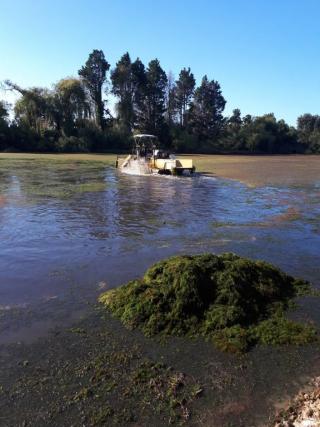 An estimated 250 tonnes of aquatic pest weed has been removed from the southern end of the Awatapu Lagoon, as part of a joint Whakatāne District Council/Otamakaukau Working Group improvement initiative.
An estimated 250 tonnes of aquatic pest weed has been removed from the southern end of the Awatapu Lagoon, as part of a joint Whakatāne District Council/Otamakaukau Working Group improvement initiative.
Council staff have been working with the Otamakaukau Working Group (made up of local community members and technical advisors) since mid-2018, exploring solutions to improve water quality and enhance the southern part of the lagoon, which has the least exchange of water with the Whakatāne River and the most prolific weed growth.
Council spokesperson Nicholas Woodley says the trial to harvest hornwort and parrots feather pest weeds from a 2.5-hectare section (equivalent to the area of about five rugby fields) of the lagoon was one of the solutions considered.
"This trial will test the benefits of harvesting over traditional weed control techniques using aquatic sprays," he explains. "Harvesting means that minimal weed is left to decompose in the water, which is expected to reduce gas release, oxygen depletion and nitrogen and phosphorus concentrations in the lagoon, which are undesirable in slow moving water bodies."
The trial was carried out by Lakeweed Harvesters and Contractors last week, using a pontoon vessel propelled by paddlewheels. The front scoop has cutters on three sides and the lake weed harvested was stored on the vessel before being offloaded and transported to the composting facility in Kawerau.
The Otamakaukau Working Group is also looking at other longer-term improvement solutions for the lagoon, one option being the conversion of some southern lagoon-side areas into wetlands, to create a narrower channel with greater water depth and flow.
Council and the Working Group will be undertaking further community engagement on that proposal, as part of the local consultation for the development of a Comprehensive Stormwater Consent (see the project page for more information).
Weed harvesting has been successfully used by the Bay of Plenty Regional Council on the Rotorua Lakes since 2008. One immediate change people living near the Awatapu Lagoon have noticed is that ducks, which were previously absent from the southern part of the lagoon, have now returned.